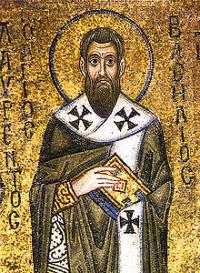
St Basil the Great (330-379)
Feast day: 1 January
The Schism between the eastern and western churches has tragically deprived us in the Roman Catholic tradition of the richness of orthodox thought and practice. It is therefore perhaps helpful to look at the life of St Basil the Great, who is celebrated in both in the east and west and venerated as a doctor of the church.
He was born in about 330 AD of a wealthy family. His father was Basil the Elder and his mother Emmelia of Caesarea. His parents were renowned for their piety. His maternal grandfather had been a Christian martyr. His father died when he was young and he was raised by his mother and grandmother Macrina. Later he received a more formal training at Caesarea in Cappadocea (Kayseri in modern Turkey). Here he met Gregory of Nazianus, and together they went to Constantinople for further studies. They also spent six years in Athens. Basil left there in 356 and, after travelling in Egypt and Syria, he returned to Caesarea where he practised law and taught rhetoric. It was said of him that he was a philosopher, a philologist, an orator and a jurist. He had knowledge of mathematics, astronomy and medicine.
Basil's life changed dramatically after he met Eustathius of Sebaste, a charismatic bishop and ascetic. He abandoned his legal practice and determined to devote his life to God. A letter describes his spiritual awakening. "I had wasted much time on follies and spent all my youth in vain labours and devotion and a teaching that God had made foolish. Suddenly I awoke as out of a deep sleep. I beheld the wonderful light of gospel truth and I recognised the nothingness of the princes of this world."
After his baptism Basil travelled to Palestine, Egypt, Syria and Mesopotamia to study ascetics and monasticism. He distributed his property among the poor and then spent time in solitude. However he realised that, while he respected the life of the hermit, he was not called to be one himself. It was the communal religious life that attracted him and by 358 he had gathered a group of like-minded disciples round him, including his brother Peter. Together they founded a monastic settlement on the family estate. He was joined by his widowed mother Emmelia and his sister Macrina who had already dedicated themselves to religious life. They were joined by other women. They devoted themselves to prayer and charitable works. He wrote about communal monastic life and his writings became important in developing the monastic tradition in the east and were also later to influence St Benedict.
He was ordained a deacon and then a presbyter. With Gregory of Nazianzus he spent the next few years combating Arianism, which denied the divinity of Christ. He was a strong supporter of the Nicene Creed, which declares that the Holy Spirit proceeds from the Father and the Son. He wrote: "Through the Son who is one, He [the Holy Spirit] is joined to the Father, one who is one and by himself completes the Blessed Trinity."
Basil became heavily involved in these doctrinal controversies, which were not resolved. He tried to obtain assistance from the western church and put a great deal of effort into creating good relations. However Pope Damasus seems to have shown little interest.
Basil was appointed Bishop of Caesarea on the death of the previous bishop Eusebius. Previously he had distinguished himself in administration, even to the extent of incurring Eusebius' jealousy. However he managed with tact to preserve good relations. In the diocese of Caesarea he had an exalted position as metropolitan of five suffragan bishops, some of whom had opposed his appointment.
Basil seems to have been a strong character, if sometimes hot tempered and imperious. However he was also very generous and sympathetic. He organized a soup kitchen for the poor during a famine caused by drought. He worked actively to reform thieves and prostitutes. He was eager that priests should be suitable for office and not be enticed by wealth or an easy life. He would criticise public officials who failed to administer justice. Every morning he preached to a large congregation.
Basil built a large complex outside Caesarea called the Basiliad, which included a poor house, a hospital and hospice. The Emperor Valens had quarrelled with Basil over Arianism. However he was so impressed with Basil's celebration of the Theophany (Epiphany) that he donated money to the complex.
Basil died of liver disease in 379. He wrote many important works. Among them was On the Holy Spirit, for which he used scripture and early Christian tradition to support the divinity of the Third Person. He was a famous preacher and many of his homilies including a series of Lenten lectures on the six days of creation have been preserved. He wrote three hundred letters which show a sense of humour, optimism and sympathy in spite of the many problems he had to deal with. Most of his work is available in the Patrologia Graeca.
Basil is also important in the history of Christian liturgy. Some of his liturgies and prayers are still used in the Orthodox church.
St Basil of Caesarea, pray for us.